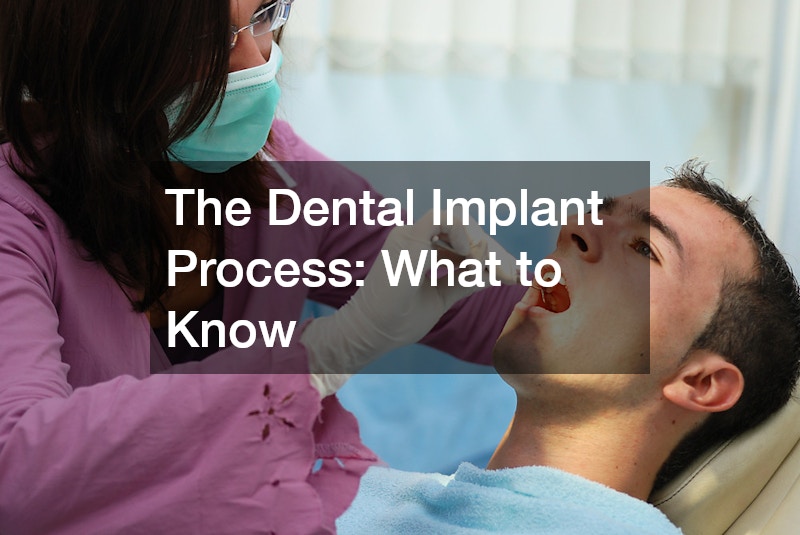
Understanding dental implants is crucial for anyone considering this procedure. Dental implants are titanium posts or screws that are surgically inserted into the jawbone to act as artificial tooth roots. They serve as a sturdy foundation for attaching replacement teeth, such as crowns, bridges, or dentures.
Unlike removable dentures, implants are permanent, providing a more natural and stable solution. The implants fuse with the bone through a process known as osseointegration, creating a secure and durable bond.
How the Dental Implant Process Works
Initial Consultation and Evaluation
The journey to dental implants begins with a thorough consultation with a dental professional. During this visit, your dentist will evaluate your oral health, including the condition of your gums and jawbone. X-rays or 3D imaging may be taken to assess the bone structure and determine if there’s enough bone mass to support the implant. If there isn’t enough bone, bone grafting might be necessary to build up the area before proceeding.
Surgical Procedure Explained
The surgical procedure for dental implants involves placing a small titanium post into the jawbone. This is done under local anesthesia, ensuring that the area is numb during the surgery. The dentist makes a small incision in the gum to access the bone and then drills a hole where the implant will be placed. Once the implant is securely in place, the gum tissue is stitched back together. In most cases, the procedure takes about one to two hours.
Osseointegration Process
After the implant is placed, the osseointegration process begins. This is when the titanium post fuses with the surrounding bone, creating a strong, lasting bond. Osseointegration typically takes a few months, during which time the patient may need to follow specific aftercare instructions to ensure the implant heals properly. This crucial step ensures the implant is securely anchored in place.
Attaching the Abutment
Once the implant has successfully integrated with the bone, the next step is to attach the abutment. The abutment is a small connector that protrudes from the gum and provides support for the final restoration. The dentist will perform a minor procedure to attach the abutment, which may require local anesthesia. After the abutment is placed, the gums will need to heal around it, which typically takes a few weeks.
Placement of the Dental Crown
The final step in the dental implant process is the placement of the dental crown. The crown is custom-made to match the color, size, and shape of your natural teeth. It is securely attached to the abutment, completing the restoration. In some cases, a bridge or denture may be used instead of a single crown, depending on the number of teeth being replaced.
How Long Do Dental Implants Last?
Dental implants are designed to be a long-term solution, but their longevity depends on various factors.
Factors Influencing Longevity
Several factors can influence how long dental implants last, including the patient’s overall health, oral hygiene habits, and the location of the implant. For example, implants placed in areas of the mouth that experience more pressure (like the molars) may wear out faster than those placed in the front teeth.
Average Lifespan of Implants
With proper care, dental implants can last between 20 to 30 years or even a lifetime. The implant itself can remain in place for many years, but the dental crown may need to be replaced every 10 to 15 years due to wear and tear.
Maintenance Tips for Durability
To maximize the lifespan of dental implants, patients should maintain excellent oral hygiene. This includes brushing at least twice a day, flossing daily, and using an antibacterial mouthwash. Regular checkups with your dentist are also essential to monitor the condition of the implants and ensure they remain in good health.
When to Consider Replacement or Repair
While dental implants are durable, they are not immune to issues. In some cases, an implant may need to be replaced or repaired. Signs of potential problems include pain, loosening of the implant, or infection. If any of these issues arise, it’s important to consult with your dentist immediately to address the problem.
Signs of Potential Implant Failure
Some common signs of implant failure include persistent discomfort, swelling, or difficulty chewing. It’s essential to seek professional care if you experience any of these symptoms to prevent further complications.
What Are the Costs Associated with Dental Implants?
The cost of dental implants can vary significantly depending on the complexity of the procedure, the number of implants needed, and the materials used.
Insurance Coverage and Options
Many dental insurance plans do not cover the full cost of dental implants, as they are considered a cosmetic procedure. However, some plans may cover a portion of the cost, especially if the implants are medically necessary. It’s important to check with your insurance provider to understand your coverage options.
Financing Plans and Alternatives
Many dental practices offer financing plans or payment options to help patients manage the cost of dental implants. This may include monthly payment plans or third-party financing. Be sure to discuss payment options with your dental provider to find a solution that fits your budget.
What Are the Benefits of Dental Implants?
Improved Dental Function
Implants function just like natural teeth, allowing you to eat, speak, and smile with confidence. They provide a secure, stable foundation for replacing missing teeth, improving your ability to chew and speak clearly.
Health Benefits Beyond Just Your Smile
In addition to improving your appearance, dental implants contribute to overall oral health. They help maintain the integrity of the jawbone, preventing bone loss that can occur when teeth are missing. Implants also reduce the risk of gum disease and tooth decay in the surrounding teeth.
Patient Testimonials and Outcomes
Many patients report life-changing improvements after receiving dental implants. From enhanced oral function to a renewed sense of confidence, dental implants have helped countless individuals regain their smiles and their quality of life.
Dental implants offer a robust solution for those dealing with missing teeth, providing both functional and aesthetic benefits. By understanding the process, costs, and benefits associated with dental implants, individuals can make informed decisions about whether this is the right option for them. As always, consulting with a dental professional is crucial to tailor the best plan to your needs.

